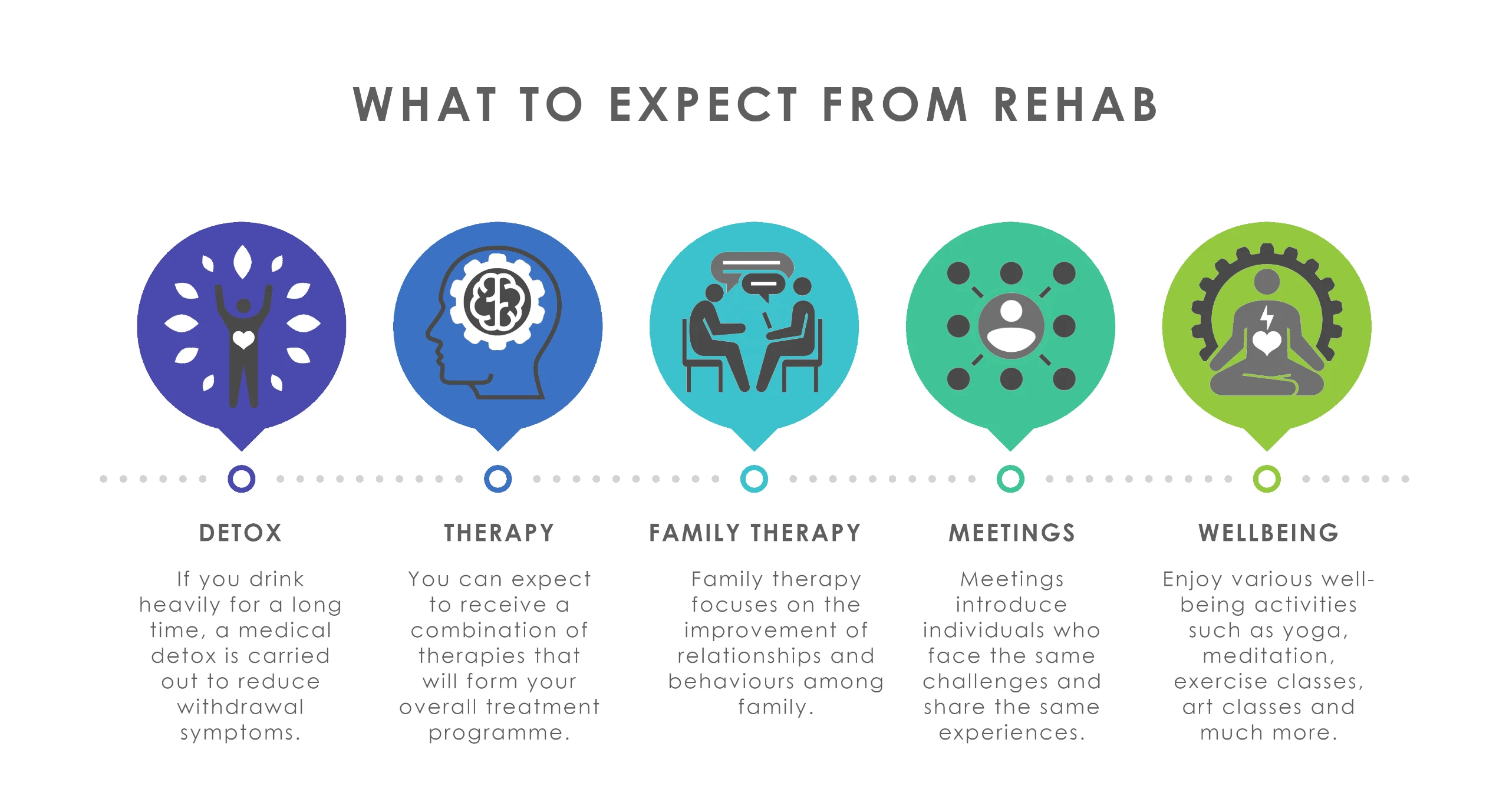Rehab, short for rehabilitation, is commonly used to describe a facility or program designed to help you recover from drug or alcohol addiction.
Rehab can also help with addiction’s co-occurring illnesses such as PTSD, burnout, depression and anxiety. These illnesses commonly co-exist and often are a driving factor for drug and alcohol abuse, as well as other health problems or illnesses.
In this article, we look at the benefits and types of different rehabilitation programmes. We also look at what is rehab and what it isn’t, and what you can expect from rehab treatment for a drug or alcohol problem.

How We Can Help
We provide clients with the opportunity to access facilities that are safe, reliable, and effective.
We aim to help clients overcome their addictions, acquire helpful life skills, and reintegrate into their communities.
We strive to free our clients from feelings of loneliness and support them on their journey to recovery through the expertise of our experienced addiction treatment team.
How Rehab Works For Drug And Alcohol Addiction

Understanding how rehab works can help you decide if it’s the right choice for your treatment. Most inpatient rehabs follow a three-stage process: detoxification, rehabilitation, and aftercare.
The 3 Stages of Addiction Treatment
- Detoxification: During this stage, residential rehabs use approved pharmaceutical drugs to ease and control the symptoms of drug and alcohol withdrawal. During this time, you will be closely monitored by nursing staff and supported by therapists. Additional vitamins, a tailored nutrition plan and around-the-clock care, are delivered to ensure a smooth process.
- Rehabilitation: Rehabilitation follows detoxification and is precisely tailored to your treatment needs. It involves healing from past experiences and learning new healthy behaviours, coping strategies, and techniques for living a drug and alcohol-free life. Treatment programs combine traditional evidence-based therapies with innovative holistic approaches to address all aspects of your well-being.
- Aftercare: Aftercare is an essential part of rehabilitation that is often underestimated. It provides ongoing support and helps you recover after leaving the rehab facility. Our treatment centres prioritise reintegration, relapse prevention and further healing.
Some of our rehab facilities also offer a 4th phase of treatment that consists of a sober living community. This is especially useful for those with difficult home life, who have been gravely affected by addiction and need additional time to acclimate
Whether rehab will work for you, in the long run, depends on a) your commitment to getting well and b) the quality and length of treatment you undergo.
Some would argue that all you need to overcome addiction is an intense desire and determination. Whilst this most definitely helps, addiction is far more complex than this. Individuals with complex detox needs, trauma, or co-existing mental health problems require particular professional treatment to recover fully.
Who Needs Rehab Treatment?
Drug and alcohol use has been rising steadily over the years, with more people struggling now than ever. Poverty and demographics play a substantial role when looking at the prevalence of drug and alcohol use.
Scotland currently has the highest proportion of drug use over anywhere else in Europe, with nearly 60,000 of the Scottish population suffering from a drug problem.
England recorded 289,215 individuals in 2021/22 who sought treatment in the UK for a drug or alcohol problem.
The reality is that these figures are far higher. Many people seek private treatment or attend anonymous support groups.
Those who cannot stop substance use in the community need inpatient rehab treatment. Without it, their lives are at risk. Additionally, those suffering repeated relapses benefit hugely from intensive inpatient rehabilitation treatment.

Types of Different Rehab Centres
When choosing what kind of rehab is right for you, it is helpful to understand the different types of rehab available.
Types of Rehabilitation Treatment:
- Inpatient Residential Rehab: Residential rehab offers combined treatment methods that treat key areas where addiction has impacted your life. Inpatient treatment means you will have a safe and temptation-free environment to recover. The negative aspect of inpatient detox and rehabilitation can be its cost.
- Online rehab: Online rehab offers expert treatment and check-ins via video calls. This method is generally more affordable but only suited to a person who can safely stop substance use at home.
- Home detoxification and counselling: Home detoxification is only safe if a person is unlikely to suffer from severe withdrawal symptoms. You will need someone to stay with you 24/7 during the entire process. A qualified nurse or prescriber administers medications daily. The main problem with home detoxes is that they can go wrong if appropriate care and support are not in place.
- Day rehab centres: Day rehab centres are only suitable for those who have already detoxed from addictive substances and do not suffer from any complications such as a stressful home environment or drug and alcohol use in the home.
- Short-term and long-term rehab programmes: The duration of rehab treatment that you undergo will depend on your individual treatment needs. Rehab is most effective when a person engages in a long-term treatment programme that includes transitioning back into sober living—short-term rehab programmes for detoxification range from 2 weeks up to 4 weeks. Long-term rehab programmes can range from 3 to 6 months and up to a year or more.
What Rehab is Best?
A luxury rehab would suit you best if you are looking for inpatient rehab treatment that offers the latest cutting-edge addiction treatment and first-class surroundings.
Luxury rehabs are more expensive. However, many accept insurance policies from some well-known healthcare insurers.
One of the best things about attending a luxury rehab centre is that no expense is spared regarding your treatment and accommodation. These first-class rehab centres are available in the UK and overseas.
Depending on how exclusive you want your rehab to be, you can attend a treatment centre with your apartment and an individual therapist. In addition to benefitting from the usual rehab treatments, you can also enjoy access to facilities such as private gyms, spas and luxury treatments.
The Benefits of Inpatient Rehab

The benefits of inpatient rehab are huge. It provides a stress-free environment where you can undergo intensive treatment delivered by qualified addiction professionals. This kind of intensive therapy and treatment is often impossible in the community. Furthermore, due to the vulnerability you experience during a bespoke rehabilitation programme, it is usually not safe.
Benefits of Residential Rehab:
- A complete medical detox for any substance dependencies
- 24/7 Professional care and support
- A safe and temptation-free environment
- Bespoke rehabilitation programme
- The latest in targeted addiction treatment
- Treatment for mental health illnesses that accompany addiction (dual diagnosis)
- Access to a gym
- Holistic healing therapies
- Nutrition plan
- Psychotherapy and counselling
- Trauma healing
Inpatient rehab can work well for someone who has tried but cannot stop substance use at home or through local community services. It also works well for those who have suffered from multiple relapses by helping to get to the root causes.
Inpatient rehab also offers bespoke treatment for mental illnesses and behavioural addictions such as eating disorders, gambling and sex. Accessing intensive treatment for such disorders can be tricky, even if you pay to go private.
What Is Rehab For Mental Health?
Rehab isn’t just for treating substance abuse and dependence. Its primary function is to increase your well-being by treating any issues relating to mental health, behaviour, occupation, relationships and social skills.
Numerous mental health problems can arise out of addiction as well as contribute to it. Mental health and addiction are closely linked and should be treated simultaneously for the best possible outcome.
Where addiction and mental health disorders co-exist (dual diagnosis) and only one illness is treated, there is a substantially increased risk of relapse.
Mental Health illnesses Treated By Rehab Include:
- Anxiety disorders
- Depression
- Obsessive-compulsive disorder (OCD)
- Trauma
- Post-traumatic stress (PTSD)
- Stress-related burnout
- Eating disorders
- Borderline personality disorder
It is important to note that not all rehabs are equipped to treat mental health disorders comprehensively. Only some rehabs can offer a correct diagnosis, medication and a complete treatment plan that includes support once you leave the treatment environment.
Suffering from mental health problems is very common when you have an addiction, and this is something Detox Plus UK specialise in. We can ensure you access the right treatment programme to meet your needs.
What Is Rehab on the NHS?
Firstly, NHS rehabs do not exist. There are only two mainstream types of rehab: privately owned and charity-run.
You cannot access rehabilitation for drug and alcohol addiction through an NHS hospital. NHS hospitals can, however, facilitate a medical detox on occasion. Hospital detoxes only tend to occur when a patient is admitted via emergency services. Even then, admission is not guaranteed.
The main difference between an NHS hospital and a private rehab centre is that a hospital only treats your physical symptoms. A private rehab will treat you physically, mentally, emotionally, socially and often spiritually.
Private addiction treatment facilities are purpose-built to offer a comprehensive healing experience using targeted treatments. The NHS cannot provide this kind of specialised, intensive treatment.
If money is a real issue, you can sometimes access private inpatient rehab treatment by applying for rehab through your local drug and alcohol services. Depending on the funding available, your local services can apply for a grant for you to undergo private rehabilitation. However, something to be aware of is that this is rarely a smooth or quick process. You will need to be able to engage with your local drug and alcohol services fully and meet the criteria they set for rehab treatment.
Understanding What Rehabilitation Is And Isn’t
Rehabilitation is a crucial step in overcoming drug or alcohol addiction. It helps with addiction and addresses mental health issues like PTSD, burnout, depression, and anxiety.
Choosing the right rehab is vital to ensure you receive personalised treatment. Whilst cost is a factor, it is essential not to compromise on quality and care.
What Rehabilitation Is:
- Rehabilitation is life-saving – Addiction is a life-threatening brain disorder that often kills when left untreated. Rehabilitation provides the opportunity to undergo intensive treatment to give you the best chance of recovery.
- Time out – Rehab provides a safe and compassionate environment away from daily stresses and strains. This is crucial for healing for many people seriously affected by addiction.
- Comprehensive – Rehab programmes are extended to ensure your treatment needs are met within one episode.
- Bespoke – What works for one person won’t necessarily work for another. Rehab programmes need to be bespoke and flexible in their approach. Everyone responds to treatment differently, just as you wouldn’t offer the same treatment for another chronic condition such as diabetes; addiction treatment must be tailored for it to work.
- The key to change – For a person who has an addiction, stopping substance use isn’t enough to ensure long-term recovery. Rehabilitation highlights the need for change in each case and equips the person to implement it. A change in outlook and lifestyle is an essential part of avoiding relapse.
Residential rehabs provide a safe environment for those who need intensive support in their recovery journey.
What Rehabilitation Isn’t
- Rehabilitation isn’t a cure – Addiction is a chronic condition that cannot be cured. Happily, it can be successfully treated, and recovery can be maintained. Rehabilitation is a crucial part of the recovery process whereby you acquire valuable insight and tools to set yourself up for a drug and alcohol-free life.
- It isn’t a holiday – Undergoing rehab treatment doesn’t mean you will get to sit around all day watching TV or lounging by the pool, far from it. Rehab programmes are designed to be an immersive experience that keeps you engaged. There will be time to relax and reflect, but group activities and one-to-one therapy balance this.
- Rehab isn’t an easy option – There will undoubtedly be times during rehabilitation when you ask yourself if you are doing the right thing. Undergoing a rehab programme will mean there will be occasions where you have to face difficult emotions. This is part of the healing process, so stick with it!
- It’s not a quick fix – Rehabilitation from addiction takes time. The more time you dedicate to this part of your recovery journey, the better. Many people mistakenly think that they need a couple of weeks of rehab and they will be better. This is rarely the case. Most who suffer from addiction require a minimum inpatient stay of 6 to 8 weeks.
Access Professional Addition Treatment Now – Urgent Rehab Admission
If you or a loved one needs to be admitted urgently to a rehab centre, we can help. Our rehabs rarely have waiting lists. We can arrange an admission within 24 hours of taking your call. Let us help you eliminate the stress and strain of finding the proper addiction treatment. Our friendly experts are waiting to take your call and listen to your story.
We understand that finding the right rehab can be overwhelming. That’s why we are here to help you access the best rehab.
Our rehabs offer:
- Treatment delivered by a team of multidisciplinary professionals
- The highest levels of patient care and confidentiality
- First-class addiction treatment facilities
- Uniquely tailored rehabilitation programmes
- Full detoxification treatment
- A variety of the latest evidence-based addiction treatments
Whether you are searching for a local addiction rehab or wish to travel overseas, we can match your budget and treatment requirements with one of our exemplary rehabilitation centres. We will ensure that your admission, treatment and aftercare are smooth.





